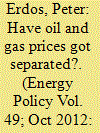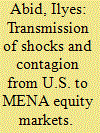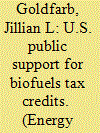| Srl | Item |
| 1 |
ID:
178839


|
|
|
|
|
| Summary/Abstract |
This study aligns with Sustainable Development Goal 7 which aims at “ensuring access to affordable, clean energy, reliable, sustainable and modern energy for all”. The Gazetted Flare Gas Regulations 2018 provides a legal framework to support the policy objectives of the Federal Government for the reduction of Green House Gas emissions through the flaring and venting of natural gas. The Regulations provide the legal basis for the implementation of the Nigerian Gas Flare Commercialization Programme. This study investigates the factors contributing to gas flaring activities in Nigeria from 1970 to 2019. Using the autoregressive distributed lag error correction representation and cointegration techniques, findings reveal, among others, that in the long-run: (1) gas flaring activities is persistent; (2) economic growth induces flaring activities; (3) gas prices exert asymmetric impact; (4) gas utilization and fossil fuel are negative predictors. The result shows that gas price contemporaneously exerts positive and statistically significant impact at the 1% level. Gas price contributes 0.187 percent increase to gas flaring while its first lag induces significant reduction in gas flaring by 0.293 percent at 1 percent level of significance. This study also provides sufficient evidence on the persistency of gas flaring activities in Nigeria.
|
|
|
|
|
|
|
|
|
|
|
|
|
|
|
|
| 2 |
ID:
115698


|
|
|
|
|
| Publication |
2012.
|
| Summary/Abstract |
This paper applies vector error correction models that show that oil and natural gas prices decoupled around 2009. Before 2009, US and UK gas prices had a long-term equilibrium with crude prices to which gas prices always reverted after exogenous shocks. Both US and UK gas prices adjusted to the crude oil price individually, and departure from the equilibrium gas price on one continent resulted in a similar departure on the other. After an exogenous shock, the adjustment between US and UK gas prices took approximately 20 weeks on average, and the convergence was mediated mainly by crude oil with a necessary condition that arbitrage across the Atlantic was possible. After 2009, however, the UK gas price has remained integrated with oil price, but the US gas price decoupled from crude oil price and the European gas price, as the Atlantic arbitrage has halted. The oversupply from shale gas production has not been mitigated by North American export, as there has been no liquefying and export capacity.
|
|
|
|
|
|
|
|
|
|
|
|
|
|
|
|
| 3 |
ID:
103213


|
|
|
|
|
| Publication |
2011.
|
| Summary/Abstract |
This article explores the influence of socio-economic discontent on the determination of decision makers to cut subsidies on natural gas for Russian households. The authors outline first the organisation of gas supplies and subsidies, and secondly the relationship between policymaking signals and public opinion concerning the minor price adjustments implemented so far. They then examine previous cases of discontent in other sectors, extrapolating implications for a major increase in gas prices. The conclusion is that Russian policymaking is characterised by a pattern of 'two steps forward, one step back': decision makers are concerned about discontent, but nonetheless they ultimately press on with reform.
|
|
|
|
|
|
|
|
|
|
|
|
|
|
|
|
| 4 |
ID:
169757


|
|
|
|
|
| Summary/Abstract |
Using a multifactor model augmented with oil and gas returns, this paper examines contagion from the US to MENA equity markets and studies the role of energy price fluctuations in amplifying the dependence between the US and MENA equity markets. We provide empirical evidence of a strong contagion effect originating from the US to MENA equity markets. The regional, oil and gas factors account for the bulk of the variance of the MENA equity returns and our findings suggest that the oil and gas markets play an important role in strengthening the dependence between the MENA and US markets during episodes of market turmoil. We discuss the policymaking importance of our results and propose a strategy to curb the adverse effects of US return shocks on MENA equity markets during episodes of stress.
|
|
|
|
|
|
|
|
|
|
|
|
|
|
|
|
| 5 |
ID:
177350


|
|
|
|
|
| Summary/Abstract |
Researchers debate the viability of biofuels to address growing global energy demands and climate change. Understanding factors that maintain and build public support for government policies bolstering biofuels is critical. Using a nationally representative survey experiment, we examine the influence of competing cost arguments and spatial variation in ZIP-code level gasoline prices on Americans' support for federal tax credits to promote biofuels. We examine the influence of competing arguments about the cost implications of biofuels for consumers on support for federal tax credits, and whether such treatment effects are moderated by respondents’ political partisanship and by variation in local fuel prices. Consistent with research on loss aversion, arguments that biofuels could increase costs for consumers were more influential than arguments touting economic benefits. However, arguments that biofuels could eventually decrease fuel costs for consumers were more influential among subjects who experienced high local gasoline prices. Finally, we found evidence of a significant partisan divide in policy preferences, and evidence that partisanship moderates the influence both of competing cost frames and of local fuel prices on support for federal biofuels tax credits. Our results add important nuance to understanding of how economic calculations affect public support for policies to support biofuels.
|
|
|
|
|
|
|
|
|
|
|
|
|
|
|
|